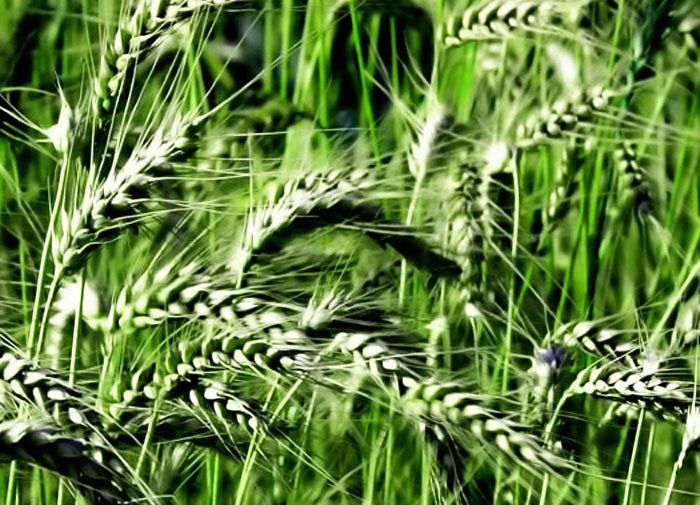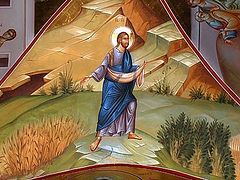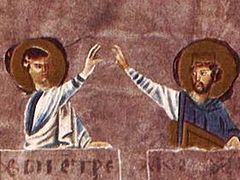As we celebrate the days of Christmas and Theophany, we keep in mind how the Lord came down to dwell among men—to be born as a little child, and then baptized in the flesh, opening the way for us to the Kingdom of Heaven.
But how can we enter this Kingdom? How can ordinary people like us feel what this Kingdom of Heaven is? The Lord has provided us with the spiritual reality of the Kingdom through His parables; that is, through short sketches and parallels.
In the kitchen
One image of the Kingdom carries us in thought to an ordinary kitchen (Mt. 13:33). A woman is making bread. She places the leaven in three measures of flour and the process has begun—the whole lump of dough has risen and it’s time to heat the stove.
Historians argue about whether we can now correctly count the ancient “three measures” of flour in today’s metric system. One of the historians is convinced that three measures would be about forty liters. Okay, let’s say that’s how much it is. Then that would mean that the woman in the parable was making bread for more than one family, perhaps even for a whole village. And to raise this entire amount of dough that woman only needed a small handful of leaven.
By leaven is meant of course a barely noticeable active force that transforms everything—our whole life and the lives of those around us.
The Kingdom of Heaven begins with an inconspicuous event, with a bit of grace. This is what this parable is about.
We often look in life for something big, large-scale, grandiose. It seems to us that spiritual events have to stagger our imagination. But here is a parable about little things, from which great things begin.
The Kingdom of Heaven begins in our lives with a small prayer, for example. I come home after a busy day. I am exhausted. I don’t have the strength to read my evening prayer rule, a full-quality half-hour of praying. And then the thought arises: If I don’t have the strength to read my evening rule, then surely I’ll have a clearer head in the morning—I’ll go to bed now and pray in the morning. What to do? This is the perfect time to remember the parable about the leaven in the three measures of flour. I’ll drop a pinch of leaven and pray briefly (read the “Our Father” and say, “Forgive my weakness, O Lord. I can’t read my prayer rule before You today, I’m tired. Bless me to rest.”) And only after a small prayer can I fall into my night’s sleep, in hopes that the night be blessed by the Lord.
It is the same with good deeds. It can happen that helping a person is largely beyond our strength, but there is nothing preventing us from doing a small good deed for that person, from our hearts. Sometimes we travel the road of goodness, headed for the Kingdom of Heaven, with the tiny steps of a child. Circumstances do not always allow us to take broad steps.
The great begins with the small. It can happen that what was dropped into the soul of a person with little faith sets in motion a complete transformation of his whole life, it would seem, established over long decades, and nothing could substitute for any part of it. The grace multiplies in the person. Then he suddenly sees that God’s grace is all-powerful, that there is never “too little” grace.
In the field
Here is another parable of the Kingdom of Heaven. Let’s go from the kitchen to the field. The parable compares the Kingdom of Heaven with a growing seed (Mk. 4:26-29). The man sows the seed on his field. Just how they grow under earth—he doesn’t see. With time the ears appear and ripen, the grain fills them, and finally the time comes for harvesting. And that is the whole parable.
What is it about? A little grain of wheat flies from the hand of the sower and lands on the earth, and in a moment it has disappeared from sight. Outwardly, nothing has happened—there was a grain, and now the earth has buried it. But in fact, it’s not like that at all—the fertile ground awakens the grain to life, not kills it. The grain grows little-by-little. Finally the sprout comes out into the open, barely noticeable. It grows on. Then it brings forth fruit—a great amount of grain. The life-giving grain ripens.
How the seeds of the Kingdom of Heaven fall into people’s hearts is something we are unlikely to see. What happens in people’s souls, in their hearts? The awakening of a new, spiritual life begins. At first the spiritual growth happens entirely unnoticed. Then this growth becomes gradually more apparent. The spiritual source is manifested outwardly. Time passes. Then the time comes for spiritual ripeness; time to bring forth fruits to God for the eternal Kingdom.
We so often try to force events. We hasten them on. We are now so used to this—fast-food is such a convenience; rapid technology is offered to especially busy citizens; and I had better pass over in silence dreams of “quick money” and training for “quick relationships”.
Let’s place the intrusive stereotypes of modern fast-culture under doubt. Real relationships between people develop over long periods of time; it can’t be any other way. If a person is able to make quick money then this money easily turns their owner in Kuzma Quickrich1 from the Russian fairy tales or into the comical Nouveau Riche of sarcastic jokes. And now about speed-reading: Some books should be read quickly, for the most part diagonally, while others should be read slowly, best aloud. And if there is no time to read slowly then it’s better not to take it off the shelf. There are a lot of courses in speed-reading but there aren’t enough courses on optimal reading, or even slow reading. True, the idea itself is in the air. There are even attempts in some cities to open cafes with healthy food—slow food. So we’ll lay aside the fashionable passion for high speeds.
Spiritual growth in a person happens slowly, like the parable of the invisibly growing seeds. Those who offer people quick spiritual growth are conmen and sectarians.
I know many people who have only recently come to the Church and are trying to cast the seeds of the Kingdom of Heaven into their close ones. They do well. Only they should remember the parable about the growing grains of the Kingdom. These seeds do not grow so noticeably or quickly as we would like them to. We need patience, and then we will go through our whole lives, our whole spiritual path from young sprouts to the healthiest ripeness. And we will bring forth fruits to God.





